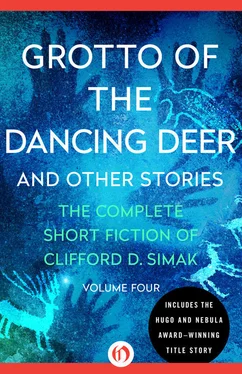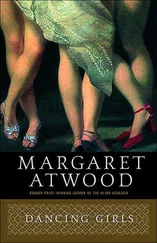He nudged his horse around, lifted the six-gun. “Miss Page, if you please will—”
“No!” screamed Alice Page. “You can’t—you can’t—”
She was running toward him, arms flung up as if to ward off the bullet that the gun was set to throw.
“Alice!”
The bellow was bull-throated and it stopped the girl in mid-stride, swung her around.
“Father!” she cried.
Preacher Page stood beneath the tree where Pinky lay sprawled with a lolling neck and he held a heavy rifle at the ready.
“Get away, child,” he bellowed.
Randall jerked the six-gun up and then stiffened. The rifle muzzle in the old man’s hand was pointing at his midriff. If that gun went off …
“Throw away the gun, Randall,” said Preacher. “Throw it away and get down off that horse.”
Randall hesitated.
Preacher squinted his eyes. “I am not a man,” he said, “who wishes to shed blood, but if you don’t heave that gun away, I’ll let you have it right through your dirty guts.”
Randall heaved the gun away, scrambled off the horse. Sylvester stepped out and picked up the gun.
Slowly Preacher moved toward Randall. “See if he had any other guns,” Page told Sylvester.
Swiftly, Sylvester ran his hands up and down Randall’s coat.
“Not a one,” he said.
Preacher heaved his rifle to one side.
“Get up your dukes,” he told Randall. “I’m going to give you the worst beating that a man has ever taken.”
Randall sprang forward, one fist lashing out, the other cocked for a killing blow. Preacher ducked, slid under the swishing fist, uncorked a punch that skidded Randall on his heels.
Then the two were together, slugging toe to toe, boring in, absorbing punishment, deadly silent. Their feet beat a stolid measure on the grass and there came the sound of flesh on bone, the rasp of heavy breathing, the muffled grunt and panting breath of earnest men fighting with a deadly hatred.
Randall was weakening. Under the sledge-hammer blows of the minister, he was falling back. Once he tried to break away and run, but Preacher chased him, closed in and forced the fight.
The end came swiftly. A blow staggered Randall and Preacher moved in slugging, right to the jaw, left to the heart, another right to the jaw that lifted Randall off his feet and slammed him to the ground.
For a long moment the old man stood in the sunlight above the fallen man, his white hair shining and stirring in the breeze, his chest rising and falling as he gasped for breath.
Then he turned away, walked to the three, brushing off his coat, straightening his shirt cuffs.
“Either of you want that man?” he asked.
“I do,” Sylvester told him.
Preacher looked at Packard sternly. “I was hoping it might be you.”
Packard shook his head. “Not me. I guess I’ll be riding again. No use of going back to Hangman’s Gulch.”
Preacher reached out his arm and drew Alice to his side. “Got to worrying about you, child,” he said. “Thought what a foolish thing it was for me to send you off on that stage. So I got a horse and rode. Thought that I might catch up and sort of ride as guard. See you safely through. But I was too late. I heard shooting …”
He brushed at his eyes with a gnarled hand.
Packard reached up to his throat, was surprised to find the rope still dangling there. Savagely he ripped the noose open, tossed it over his head, turned and walked away.
There was a horse tied up in the timber. It would be an easy matter to get there by just ambling along. Then he’d jump into the saddle and no one, he was sure, would try very hard to catch him.
For after all he was almost as bad as Pinky or any of the others. Not in as deep, perhaps, but not because he hadn’t tried. There was no use trying to fool anyone. He’d tried to get that gold, tried just as hard as any of the others.
“Packard!”
He heard the thump of feet behind him, stopped and waited. Slowly he turned to face the old man.
“Yes, what is it?”
“You’re going back with us,” said Page.
Packard shook his head. “No, Preacher. Hangman’s Gulch is going to be a respectable town now, with Randall and his gang mopped up. And I don’t belong …”
“Look, Packard,” said Preacher. “I want you to listen to me. Next Sunday I’m going to get up in the pulpit and I’m going to tell the people who I am. And I want to make a deal with you—”
Packard gasped. “But you can’t do that. You’re sitting pretty. There’s no reason for doing it.”
“But there is a reason. I’ve got to be square with myself. I can’t go on living a lie.”
“All right,” agreed Packard. “Have it your own way. But I can’t see where it has anything to do with me.”
“I told you I had a deal,” said Preacher. “If the people throw me out, all three of us will leave, you and I and Alice. But if they let me stay, all three of us will stay.”
Packard looked beyond Preacher at Alice and her eyes, he saw, were smiling.
“Is it a deal?” asked Preacher.
“It’s a deal,” answered Packard, not even looking at him.
One of Clifford Simak’s journals notes that he sold a story entitled “Apron Strings” to Horace Gold on May 1, 1958. Given its publication date, the November 1958 issue of Galaxy Magazine , and its subject, playtime for humanity, I think that the timing is about right for “Apron Strings” to reappear.
This story is also another example of Cliff Simak’s proclivity for featuring cavemen in his science fiction.
—dww
I
For some time, Stanley Paxton had been hearing the sound of muffled explosions from the west. But he had kept on, for there might be a man behind him, trailing him, and he could not change his course. For if he was not befuddled, the homestead of Nelson Moore lay somewhere in the hills ahead. There he would find shelter for the night and perhaps even transportation. Communication, he knew, must be ruled out for the moment; the Hunter people would be monitoring, alert for any news of him.
One Easter vacation, many years ago, he had spent a few days at the Moore homestead, and all through this afternoon he had been haunted by a sense of recognition for certain landmarks he had sighted. But his visit to these hills had been so long ago that his memory hazed and there was no certainty.
As the afternoon had lengthened toward an early evening, his fear of the trailing man began to taper off. Perhaps, he told himself, there was no one, after all. Once, atop a hill, he had crouched in a thicket for almost half an hour and had seen no sign of any follower.
Long since, of course, they would have found the wreckage of his flier, but they might have arrived too late and so, consequently, have no idea in which direction he had gone.
Through the day, he’d kept close watch of the cloudy sky and was satisfied that no scouting flier had passed overhead to spot him.
Now, with the setting of the sun behind an angry cloud bank, he felt momentarily safe.
He came out of a meadow valley and began to climb a wooded hill. The strange boomings and concussions seemed fairly close at hand and he could see the flashes of explosions lighting up the sky.
He reached the hilltop and stopped short, crouching down against the ground. Below him, over a square mile or more of ground, spread the rippling flashes, and in the pauses between the louder noises, he heard faint chatterings that sent shivers up his spine.
He crouched, watching the flashes ripple back and forth in zigzag patterning and occasionally a small holocaust of explosions would suddenly break out and then subside as quickly.
Читать дальше












